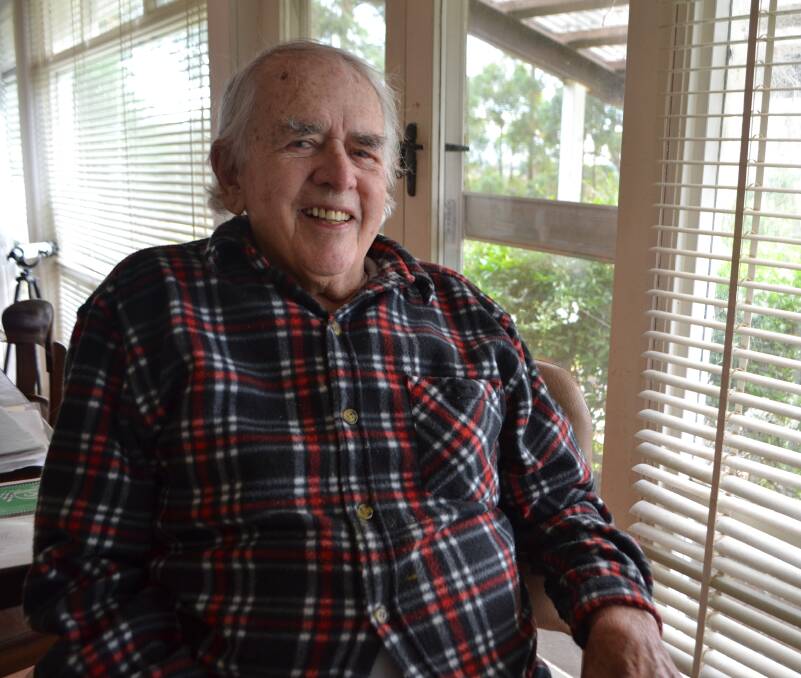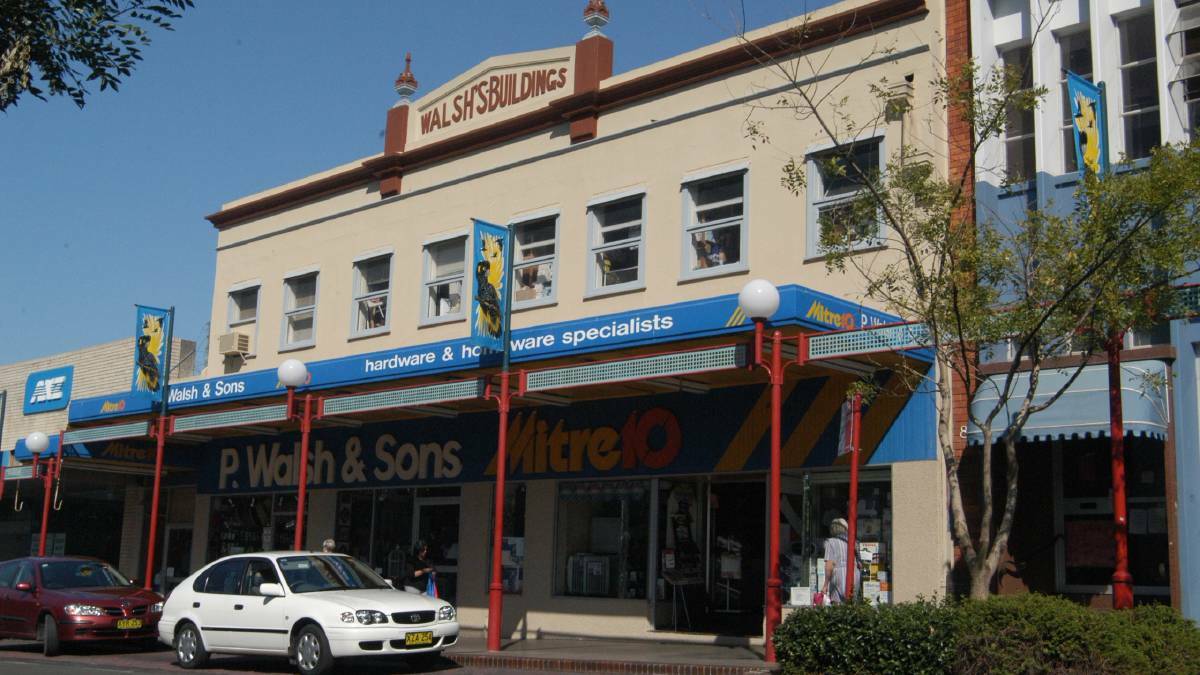
One of the Shoalhaven’s longest continual links with retailing in the Nowra CBD has been lost with the death of Peter Walsh.
Subscribe now for unlimited access.
or signup to continue reading
Mr Walsh died on June 1, aged 93.
In July last year South Coast Register journalist Jo O’Dowd sat down with Mr Walsh, who had a fantastic memory for detail, to gain some of his recollections.
PETER Walsh is a man full of memories, nearly as full as his old Junction Street store used to be filled with tools, kitchen wares and gardening supplies.
His memories stretch right back, nearly 100 years, to when Nowra’s dusty streets were filled with horses and carts and farmers would get dressed up to come into town.
Although the Walsh’s store on Junction Street is now empty, many locals have fond memories of the store that used to be a hive of activity.
His grandparents first started a general store on Holme Street, Terara in 1877.
“We came up to Nowra in 1893, that’s the year the railway came,” he said.
The main building of Walsh’s on Junction Street was designed by Cyril Blackett and is still an iconic sight along the main street.
“Back in those days a general store would sell everything. The men working in the store would wear a shirt and a jacket and then an apron tied in the middle right down to their ankles and everything came in cartons,” Mr Walsh said.
One of the jobs Mr Walsh had as a youngster was cutting up the butter.
“You would go to the dairy company in the morning and you would buy butter to sell in the shop. We had a frame with wires across it and it had to be scrupulously clean so it wouldn’t contaminate anything. It was divided in such a way that if you pressed it one way you got one pound of butter per block and then if you turned it around and pressed it through again you got half pound blocks. Every pound that you packed had to be weighed individually, even if it was missing a few grams of butter it would have to be put on individually, slither by slither, because inspectors would come around and weigh all of the butter in the shop,” he said.
When he was growing up, his family home was No. 1 Junction Street.
“We had a tennis court beside the house and during the Depression my father put in Ben’s Walk.”
Back then the Nowra Show would go for three days.
“It was huge and everything closed for the show. It was a great thing back then,” he said.
Before the war started there was a dairy company in Bomaderry, a condensed milk factory and the Horlicks factory among others.
“It had all those kind of companies there as well as a cheese factory. That was a great thing to employ people. But when the war started the supply of the materials needed to produce these things dwindled.
“There used to be over 100 dairy farms supplying milk to the factories in Bomaderry. I remember the trucks would bring the milk over from Kangaroo Valley.
I can remember when cars first started getting about and people had enough money to put petrol in them. If someone in the district bought a new car it was a newspaper story
- Peter Walsh
“They’d bring all the orders to the shops, you would give your order to the milk truck in the morning, the truck driver would bring it to the shops and we would make up the order for them and then the drivers would pick the orders up and the truck drivers would deliver all of the items off on their way back home. The Kangaroo Valley farmers had a pretty good service for them going,” he said.
“When the farmers would come into Junction Street, Tuesday was the big day. Everyone would come in to town on that day. The farmers would all go into different areas of Junction Street. All of the bush blokes would stand out the front of our shop and the other farmers, from Pyree or that, would go and stand out the front of Basha’s.
“Every farmer, when he turned 14, was given a serge suit and a pair of boots and a blue shirt and that was his going out, wedding and funeral suit. They used to keep the shoes so you could see your face in them,” he said.
“I can remember when cars first started getting about and people had enough money to put petrol in them. If someone in the district bought a new car it was a newspaper story.
“Nowra was a wonderful town when I was a boy. They had a big dramatic society which my father used to be president of. They used to put on all kinds of plays, like The Mikado and the shows would run for five days.”
Before the war started, Mr Walsh wanted to be a mechanical engineer.
“I’ve always had a passion for the way things worked and for cars,” he said.
“The war started when I was in fourth year [Year 10] and it mucked everything up. The town stopped. Everything stopped.”
Mr Walsh was in the army for four years and away for about 18 months of that time.
He was stationed in South West Pacific at Ambon, an island off Borneo.
“I went where I was told to go. Everyone was a victim of circumstances.
“When I came back from the war it was an exciting time. Everything was run down so the first thing I did was try to get it up to modern standards,” he said of the store.
“When I came home out of the army there was hardly anything available. People don’t realise how bad it was and how hard people did it when the war rationing came in.
“I remember people would get four gallons of fuel for a month for a car. For a farmer, they might get six. He would have to run his milking machine and his corn thrashing machine and everything like that.
“We used to get six gallons of paint a month with the rationing. That’s nothing. It was very different back then. There was no money and banks were incredibly tight with money,” he said.
Eventually Mr Walsh started Country Traders before becoming a Mitre 10 franchisee, a chain that was as big as Bunnings in its heyday.
Mr Walsh spent the next decades building up stock and venturing into different areas.
Nettie Sullivan of North Nowra was one of the many employees who worked for the family, starting in 1983 and finishing up in 2013.
Mrs Sullivan came to Walsh’s after the Waltons store closed down.
“I came in and saw the late Mrs Jean Walsh and inquired about the chance of a job,” she said.
“She took my name and number and said she would get back to me – the next day I got a call from her to start work.”
That was in the kitchen section with Mrs Walsh, where she remained for about six months.
“Mr W [as she called Peter Walsh] hijacked me into the hardware section and I stayed ever since,” she said.

She wasn’t the first woman in the hardware section, taking over from Margi Loiterton.
“I knew nothing about hardware,” she said, “although I have always liked gardening and being in the garden.
“I had a great teacher in Reg Walton who I worked with for a number of years.
“It was funny, male customers would come in and say, ‘I want to be served by that man over there [Mr Walton]. Reg would just say, ‘Jeannette knows as much as me,’ and left it at that.
“Over the years I suppose they all got used to having a female in the hardware section.”
She described Mr Walsh and his late wife as absolutely brilliant to work for.
“I couldn’t have had better bosses. They were always upfront and honest. Mr W is the type of person who would give people a go and if any of the employees were going through a hard time, he was always willing to help out,” Mrs Sullivan said.
When she started there were around 36 employees in the Junction Street store.
“We had four office ladies including Mrs W and two or three permanent staff in each department as well as a few casuals,” she said.
“Mr and Mrs W were a good match and worked well together. If I could have half of their brains for business,” she said.
She feels sad that the Junction Street store is now empty.
“Every time I walk past I automatically look up to see if the girls are at the front counter. But there’s just a big empty store now,” she said.
“It’s left a large hole.”
For Mr Walsh the empty store is a sign of the times.
“You can’t stop evolution. You can’t compete with the multinationals,” he said.
Not only a businessman, he was also actively involved in the community through the White Ensign Club and the hospital board.
He is still passionate about the town he grew up in and wishes Nowra would embrace its history.
“Nowra is the first town in Australia that has had four Melbourne Cup winners,” he said.
“I reckon they should have made some kind of park. De Mestre’s old house is still there in Terara.
“Nowra needs to show more pride in its history. I used to fight the council tooth and nail but I am peace-loving. I never went against anything that was sensible.
“This is where it’s all collapsed. They never kept history, they burnt it or pulled it down.”
Hopefully the many happy memories people have of the old Walsh’s store on Junction Street will help an important part of Nowra’s history live on.
Late of Nowra, Mr Walsh was the beloved husband of Jean (deceased) and father of Julie, Cathy, Paul, Benjamin and Anthony.
A much loved grandfather and great grandfather and cherished by his niece and nephews.
A requiem mass for Mr Walsh will be held at the St Michael's Catholic Church Nowra on Thursday, June 9 at 10am, following on to the Nowra General Cemetery.
In lieu of flowers donations can be made to Caritas.

